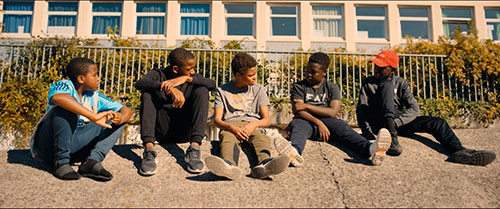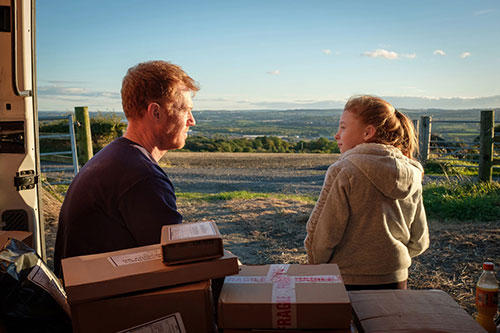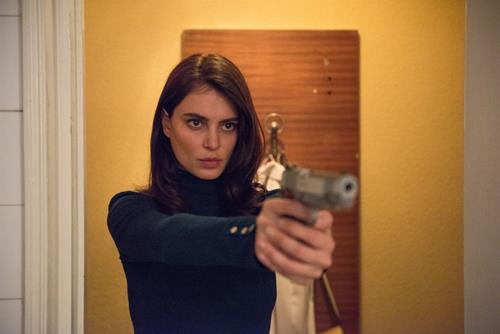
Cannes 2019. The First Days.
Publié par Birgit Beumers - 24 mai 2019
Catégorie(s): Cinéma, Expositions / Festivals
The 72th edition of the Cannes film festival opened with Jim Jarmusch’s zombie film The Dead Don’t Die, starring Bill Murray and Adam Driver as village cops Cliff Robertson and Ronnie Peterson, displaying a deadpan humour and absolute quiet in the face of the extraterrestrial undertaker Zelda (played by Tilda Swinton), cannibalistic zombies rising from the graves in increasing numbers, and their gruesome victims. Ronnie keeps repeating the phrase that this will all end badly. In a witty exchange with Cliff, who wants to know why Ronnie keeps repeating the phrase, the latter admits to having read the script; Murray only got to read his own scenes. “This will end badly” will remain a tagline for several films in competition.
The next day in Cannes continues with stories that “end badly”: Bacurau by Kleber Mendonza Filho and Juliano Dornelles, and Les Miserables de Ladj Ly. The Brazilian Bacurau concerns a remote village whence Teresa travels for her grandmother’s funeral. And along with a number of brutal killings and extraterrestrial interferences, this village gradually disappears from the maps. Full of allusions to contemporary politics in Brazil, the exploitation of the Amazonas regions and related environmental issues, the film is an extended metaphor for contemporary life, ending in overall destruction. Les Miserables does not end well either: following a series of clashes between the crime squad of Stephane, Gwada and Chris with the local multi-ethnic population in the suburb Montfermeil (the setting gives the film its title: it is the suburb of Paris where Victor Hugo set Les Miserables), it is the conflict between generations more than ethnic and cultural backgrounds that drives the narrative. The film impresses with its observational mode of the escalation of violence and the distance to the new cop, Stephane, in the suburb.

As experienced spectators of Ken Loach, we know that his films end badly, too: this time, however, the conclusion for Sorry We Missed You is more ambiguous than the tragic death of Daniel Blake in Loach’s previous film: the van driver Ricky, who has gone self-employed and is subcontracted by a delivery company, gets caught up in a vicious circle: His expenses rise as he tries to increase his income, putting his stable family life at risk before going down a road of self-destruction to ensure his family’s survival. The film touches thus on the dehumanization through work management in the modern world.

The works of a number of maîtres of cinema in competition have shifted the more interesting and innovative work to Un Certain Regard, which contains some strong debut and second films. An exception in the name-heavy competition is Jessica Hausner’s Little Joe, her first English-language film and the first in the Cannes competition. It is a very sterile film that keeps the spectator deliberately at an emotional distance, allowing for a play with ambiguity: whether this concerns the genetic engineer Alice (Emily Beecham), suffering from psychiatric issues and depression as a result of the break-up of her marriage and the overwhelming responsibility for her son; or whether it affects things happening to her genetically manipulated happiness-flower nicknames Little Joe, and whether its scent can actually change the world into one where said happiness comes at the price of a lack of care for anything but the plant, which thus compensates its own infertility. Visually beautifully shot and capturing the sterile, scientific approach right down to the costume design, this film offers a frighteningly concise diagnosis of the dehumanization of the world.

The films of the maîtres, then, stay largely within genre conventions: whether this is Pedro Almodovar’s Pain and Glory, exploring the failed career of a famous filmmaker; or Diao Yinan’s Wild Goose Lake that follows his Berlin-winner Black Coal, Thin Ice, which stays well within the convention of the crime drama with a romantic subplot involving a prostitute; or Corneliu Porumboiu’s La Gomera (The Whistlers) that remains in the crime story genre. Yet none of these films offers a happy ending: they all “end badly”. The same is also true of Terrence Malick’s Hidden Life about the Austrian Franz Jägerstätter who, refusing to swear an oath on Hitler required of all Austrian recruits, knows his end. Told through long takes of the powerful Austrian mountains in Radegund rather than words, the film continues the filmmaker’s traditional approaches.
Maybe the second week will break through the “bad endings”, and with it the genre adherence of the competition entries.
